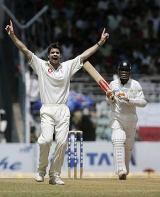While Andrew Flintoff led the team with passion, aggression and imagination to get the best out of a team comprising largely of inexperienced cricketers, the Indian Captain having a wealth of talent at his disposal failed miserably in motivating his team and marshalling his resources.
Indian team showed its negative approach from the very beginning of this test match. The negative attitude reached the zenith when we found Irfan Pathan walking out to open the innings on the 4th day evening. As if an icing in the cake, Indian think tank sent in Anil Kumble as one drop in the guise of night watchman.
May be they thought highly of the tail waging and expected that the top order guys will score better if they waged in the tail. What a thought... from the dream team captain and dream outspoken and working for free (he has no financial reasons you see) coach. One must clarify here that Greg Chappel has taken up the Indian coach assignment purely for achivement and nothing else. The money that he will earn from this assignment seems "not at all important" to his life and finances.
We must send million flowers to Mr. Kiran "hole mouth" More for his public utterances that the current selection committee will never look back on selecting Ganguly, even the later shows good performance in the domestic cricket. What a shame? What if Ganguly scored a back to back double hundred in domestic cricket? No, he cannot be selected for the Indian team. Because, More cannot look back. He has stiff neck you see!
Read the additional piece from www.cricinfo.com
India v England, 3rd Test, Mumbai, 5th day
A diabolical capitulation
March 22, 2006
| | 
|
Capitulations are rarely honourable affairs, but even by Indian standards this was particularly lily-livered and shameful. Even in an Indian batting hall of infamy, which houses such gems as the 66 all out at Durban (1996-97) and the 81 at Barbados a few months later, this has to take pride of place. Faced with an English side magnificently led and inspired by Andrew Flintoff, India could offer nothing but diabolical shot selection and lack of fight that would have shamed a peacenik.
Having played Johnny Cash's Ring of Fire in the dressing room at lunch, England then came out and incinerated a line-up that has been living on former glories for two seasons now. To lose nine wickets in a session and a half is slipshod, but to lose seven wickets in a mere 15.2 overs after lunch borders on the ridiculous. Rahul Dravid, who made a rare error of judgement to start the slide, was being extremely charitable later when he said that some of his boys had chosen "the wrong options". As at Bangalore against Pakistan last year, India offered all the resistance of a Coke can under a steamroller when a little pressure was applied.
Mahendra Singh Dhoni's scatterbrained effort encapsulated the surrender. Not content with having given the hapless Monty Panesar catching practice once, he went for it again, forgetting minor details like the state of the game. He can count himself fortunate that he was born in Ranchi, and not Darwin. At Sydney in 1993, Damien Martyn played a shot that was infinitely less atrocious, and then spent the best part of his 20s wandering the wilderness.
But the culpability started at the very top. It's a damning indictment of India's batting resources that the third-highest run-maker for them in the series was Anil Kumble with 128 runs. Virender Sehwag, Sachin Tendulkar and Dhoni managed 284 runs between them - 11 more than the modestly talented Paul Collingwood - with Sehwag's fitness or lack of it now of paramount concern.
Inzamam-ul-Haq's back problems give Pakistan supporters sleepless nights, but in his case, he can point to the rigours of a legendary 15-year-career. Sehwag has been playing Test cricket a little over four seasons and his puffed-up figure and lethargic reactions in the field are more in keeping with someone Shaun Udal's age. Flintoff himself was once derided as a fat boy, and his transformation into the world's best allrounder has had everything to do with getting himself in good shape for the task.
Apportioning blame after such debacles is easy, but if anyone emerges with credit from this nightmare, it's the bowlers, who were just magnificent and kept India in the game after an indifferent opening day. Anil Kumble led by example, as he always has, and S Sreesanth and Munaf Patel have nothing to be ashamed of after a series in which their immense potential was revealed.
But where India's pace bowlers were good, England's were exceptional. Both Flintoff and Matthew Hoggard - as impressive on this tour as Jason Gillespie had been in Australia's 2004 triumph - bowled with unstinting effort and tremendous skill on a pitch that offered little more than decent bounce. They moved the ball around just a touch at lively pace, and the dismissal of Wasim Jaffer, trapped in front after being set up by a succession of bouncers, was indicative of how adroitly they implemented the game-plan.
There was a touch of romance too at the end. Even if Udal never plays for England again, he'll never forget the afternoon when he did for Tendulkar to set in motion the Indian pack-of-cards trick. He's certainly no mystery spinner in the Jack Iverson mould, but his attitude and perseverance epitomised the real strength of this England side. They came into the Test series in disarray, and left it with a draw that felt almost as good as a victory.
Dileep Premachandran is features editor of Cricinfo
© Cricinfo
Have you seen my other blog?